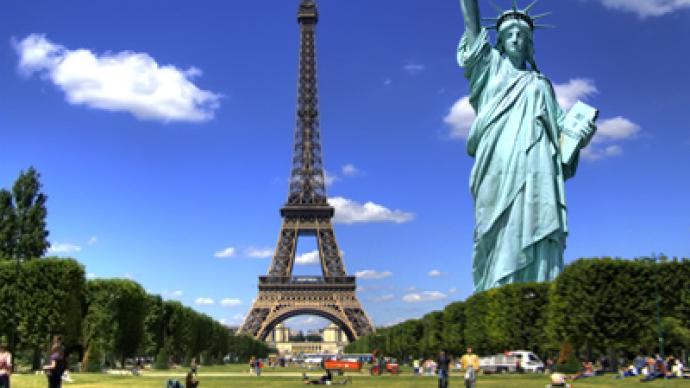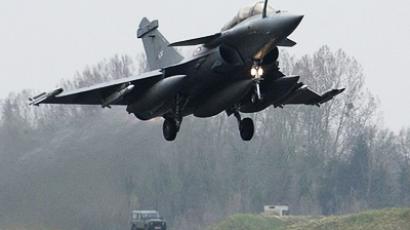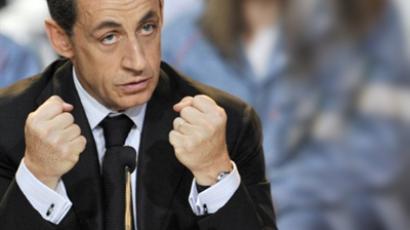France ‘turns into a little US’ on costs

The French resort of Deauville is hosting this year’s G8 summit. The host country has done a U-turn since the last time world leaders gathered there, turning from the biggest war critic to the biggest war trumpeter.
The summit is due to discuss nuclear safety, Libya and the Arab world uprisings, the Middle East peace process and many other issues. On the sidelines of the summit, Russian president Dmitry Medvedev, who has already arrived in France, will hold a number of meetings with world leaders. He is expected to meet with the US president Barack Obama to discuss the contentious issue of the US missile defense shield in Europe.Eight years ago the G8 summit's agenda looked almost the same as today: war, the economy and, somewhere in the middle, aid to Africa. On the table then were Iraq and boosting the euro; now it’s Libya and saving the euro.But in 2003, France had a very different stance on global politics. Then it was staunchly opposed to the US invasion of Iraq. French fries quickly became “freedom fries” after France-US relations soured despite summit smiles.But with a new French president came a new friend.“Sarkozy has rejected entirely the possibility of France playing a constructive role in a multi-polar world and has aligned himself with the single superpower, the US,” said French author Diana Johnstone.Nowadays France is barking much louder, with more soldiers involved in foreign military conflicts abroad than ever before.“It’s globalist modern colonialism,” argued Ludovic De Danne, the European affairs adviser for Marine Le Pen, president of the French Front National party. “It’s not just France. It’s a global plan to change governments as they want.”France played a central role in Ivory Coast’s bloody presidential stalemate and is considered the unspoken leader of the intervention in Libya this spring.“Sarkozy wanted us to participate and to be one of the first Western rulers to go there just for his political agenda,” De Danne said.Critics say this new global policy was meant to win over French voters but has not worked.“France is sort of a small US, with many interventions that are very costly and very little thinking about the relationship between rhetoric and the cost,” said Pierre Guerlain, a professor of political science at Paris West University Nanterre La Défense.And cost is the killer. European countries are facing more and more protests over huge spending cuts in an attempt to lower deficits and save the drowning euro.The sex scandal involving International Monetary Fund head Dominique Strauss-Kahn might have knocked out a top contender competing against Sarkozy for the presidency, but experts say Strauss-Kahn was toppled at the wrong time.“You’ve still got worries about whether the euro will still be the currency of all these European countries in the next 12 to 24 months,” explained Alexander Law, chief economist at the Xerfi Group, a French economic institute.And at the same time, they are spending hundreds of millions forcing their way into the Libya conflict.“They don’t see eye to eye, but they’re going to try and regroup around the idea that it’s a humanitarian intervention and the UN resolution,” Guerlain said.China and Russia did not veto the resolution, but since it was passed many have claimed that it has been manipulated to suit Western interests.“Perhaps there will be an appearance of agreement, but if there is an appearance of agreement, to my mind it will only be an appearance,” Johnstone stated.
France’s involvement in Cote d’Ivoire not colonialism – researcher
John Kirton, director of the G8 Research Group at the University of Toronto, thinks that if anything should emerge at the G8 summit, it will be France’s involvement in the conflict in Cote d’Ivoire. Kirton, however, denies that France sent its troops to the African country to fulfill old colonial ambitions.“The leader of the Ivory Coast will be at the summit to give a first-hand account not just of what has happened, but of the future for his country and for the rest of Africa as he sees it,” said Kirton. “But what we see in the Ivory Coast, I think, is the implementation of the UN-approved international responsibility to protect. The international community, through the UN, granted approval for the intervention into the Ivory Coast. So, we are slowly moving away from the old military unilateral intervention of the old colonial powers of the past, toward a collective, UN-approved responsibility to protect.”Kirton also thinks the G8 summit will show some unity on the Libyan file, as all the member countries believe a democratic outcome in the North African country is still possible. But he acknowledges the divergent stances taken by the G8 members on military involvement, with France, Britain and Canada pushing for the use of force with some reluctant support from the US.“Germany has always been hesitant. Japan is not militarily involved. The Russian Federation will, I think, as an equal, ask some of the proper and poignant questions,” said Kirton.














